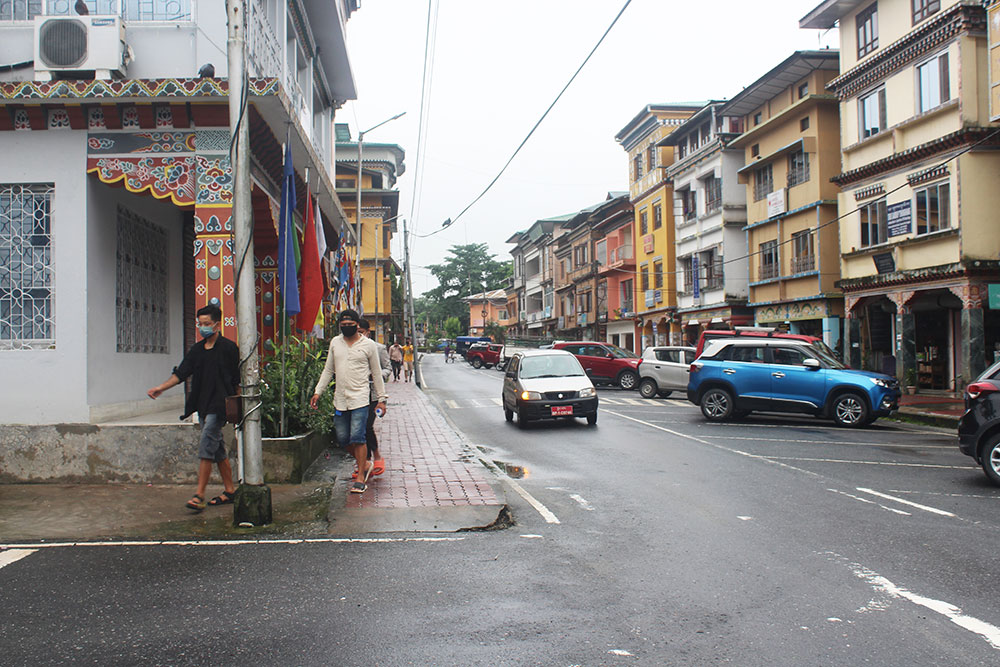Younten Tshedup
Despite stringent protocols and strict vigilance, all major bordering towns have reported local transmission cases of Covid-19. However, Gelephu, against all odds, still stands untouched.
Last year on August 10, Gelephu became the first community in the country to report a positive case from outside a quarantine facility, triggering the country’s first nationwide lockdown.
As other places along the border like Phuentsholing, Nganglam, and Gomtu in Samtse are undergoing multiple phases of lockdown today, the scenario in Gelephu is quite different. People are moving about freely and business is as usual.
Sarpang Dzongdag, Lobzang Dorji, said that given the close proximity of Gelephu to the international border, the risk of an outbreak was always looming. However, it had also given them an opportunity to strengthen the safety protocols and be more vigilant.
He said that in addition to the preventive and cautionary measures put across all the bordering areas, the taskforce in Gelephu has added multiple layers of surveillance and enhanced monitoring system in place.
Dzongdag Lobzang Dorji explained that teams comprising de-suup, police and other officials move around monitoring the implementation of protocols at all the high-risk areas, every week.
He said that Gelephu’s success so far was also because of its different dynamics in comparison to other bordering towns. “Our dynamics are different from that in Gomtu and Phuentsholing,” he said.
“While we do have some places where communities — Bhutanese and Indian — are in close proximity, the majority of our settlements are far-flung and scattered from the international border.”
The dzongdag said that the point of entries (POEs) in Gelephu were also secured with adequate numbers of frontline workers. “We do not keep the number of our POEs static. We constantly relocate them as and when we feel necessary and also increase the numbers including the manpower.”
Another comfort, the dzongdag said, came from the ‘not-so-grim’ situation across the neighbouring Indian towns of Kokrajhar and Chirang. “These Indian districts have not reported wide-spread of the virus and we have heard that many people there have already received their second dose of the vaccine,” he said. “As long as these places don’t report wide-spread cases, the threat to us is less.”
However, he added that the authorities are taking all the precautions given that the Delta variant of the virus was fast spreading. “We will continue to do what we have been doing and the government has also been very supportive in providing us all the necessary support and resources.”
Gelephu vs Phuentsholing
Lauding the success of Gelephu in preventing local transmission, Sowai Lyonpo (health minister) Dechen Wangmo said: “We are praying and hoping they do not report any cases but at the same time, I’m being realistic and preparing if in case Gelephu do report an outbreak.”
Lyonpo said that it was not that Gelephu had done something right and the other bordering towns did something wrong. “I think it is just a matter of time. Of course, we cannot compare Gelephu and Phuentsholing, for example.”
She said that all the odds were against Phuentsholing. “In terms of population density, space and interactions across the border, Phuentsholing is in a tight spot,” Lyonpo added. “Anyone coming from abroad lands up in Phuentsholing and most of them are turning positive. A lot of the factors are against Phuentsholing.”
As per data with the 2017 Population and Housing Census of Bhutan, the population in Gelephu Thromde was 9,858 compared to 27,658 in Phuentsholing Thromde.
Lyonpo said that the population in Phuentsholing was four times more than that in Gelephu and the space was four times less. “Given all these challenges, what Phuentsholing has achieved so far is fairly amazing.”
She added that as the lifeline of the country, Phuentsholing has been holding the fort very well. “Movement has to happen every day. If not, the rest of the country will suffer. Any disruption at the mini dry port would cause major inconvenience to the rest of the country.”
The medical team, task force, and officials, Lyonpo said, has been working tirelessly to contain the spread of the virus to the rest of the country. “It is easy to point fingers when things don’t seem to work but people must also understand how difficult it is to hold the fort. People in Phuentsholing have the biggest task in their hands to keep the rest of the country safe.”
Edited by Tshering Palden


